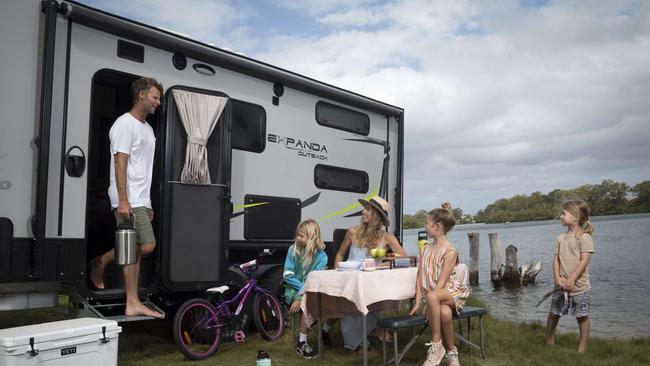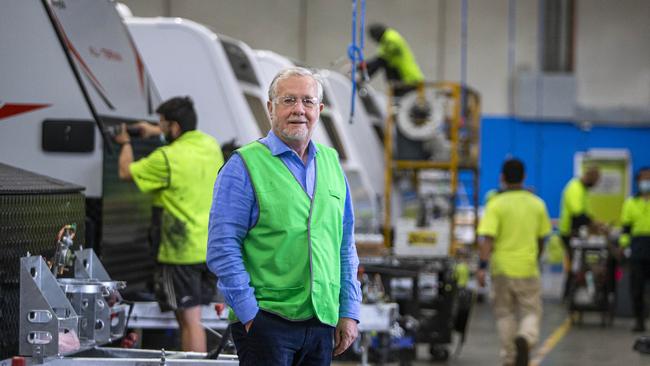Have RV, will travel as borders allow during pandemic
Australians have used the pandemic to reassess what holidays need to be and are taking to the great outdoors.

Corporate leaders benefiting from a domestic tourism boom believe the pandemic is creating a customer base that will remain loyal long after the borders reopen.
Founder and owner of RV and caravan manufacturer Jayco Gerry Ryan told The Weekend Australian that after an initial Covid-19 scare, his business – which has revenues in excess of $500m per year – is performing better than it was before the pandemic.
“Since May and June we have seen continuous growth and we’re currently running about 35 per cent higher the previous year in sales,” Mr Ryan said.
“For the 2020 calendar year we finished with 10,600 units produced, and that was with eight weeks out of production, so this year our budget is 13,800 units.”
Mr Ryan said the biggest sales increases were in states less impacted by the pandemic, but the business has been performing well and attracting a younger demographic.
“If you take each state, the big lift was certainly in Queensland and WA,” he said.
“But there’s people that would have looked at other alternative international holidays such as Bali and Asia and the like, who have suddenly looked around and said: ‘what we can do?’ So, they are coming into caravanning for the first time.”
This younger demographic is also proving to be a keen purchaser of caravan accessories – and pleasingly for Mr Ryan, who is part owner and founder of the Mitchelton-Scott professional cycling team, bike accessories are top of the list.
“Our products are evolving into more lifestyle adventure products, people are taking them off road or putting their bikes on,” he said.
“About 75 per cent take bike racks with them and we have a range of electric bikes we sell.”
Mr Ryan — who with an estimated net worth of $567m is placed as the nation’s 208th richest person on The Australian’s annual The List — also has interests in a holiday park and winery in Nagambie, a lakeside town two hours north of Melbourne. Business has been booming there too.

“Mitchelton Wines is running at 98 per cent capacity, the numbers are 58 per cent where they were a year ago,” Mr Ryan said.
“The Nagambie Lakeside Leisure Park is booked out for the next three years at Christmas, Easter and the long weekends, and it can hold 2500 people.”
Mr Ryan said he is confident that interest in holiday parks and caravanning will remain strong after the borders open.
“People having been camping for a long time and will continue to camp, Covid-19 has made people aware of the value of time with your family and friends,” he said.
“Something like 55 per cent of Victorians in 2019 had never gone into Regional Victoria – so what a great opportunity, people are being exposed to what’s out there.”
Veteran caravaners have also observed a rush of newcomers. Jade Sutcliffe, her husband Wes Berg and their three children have been caravanning for years and have never seen the grounds so busy, mostly with young families like themselves.
“We’ve seen heaps of first time caravanners – you recognise them because you were a first time caravaner once too,” Ms Sutcliffe said.
“We stayed in a caravan park over Christmas and we had to help a family next to us with four boys set up their awning, it was their first time.
“I think people are taking advantage of the situation and working out how wonderful our own backyard is. We have some of the most beautiful landscapes in the world.”
Market ‘very strong’
The sentiment is echoed by Ingenia Communities chief executive Simon Owen, who operates 27 holiday parks on the east coast of Australia.
“Broadly, the market has been very strong as restrictions have been lifted,” Mr Owen told The Weekend Australian.
“At least a third of families holidaying in our holiday parks are first time users – these are families who may have previously gone to Bali or other locations, and they are looking for alternatives.
“I think there are always going to be people who want to travel overseas, particularly younger people, but there are lots of people who haven’t stayed in a holiday park and didn’t appreciate they have come a long way from the caravan parks of the 70s and 80s.”
Although Covid-19 had a significant initial impact on the holiday parks business, Mr Owen said Ingenia didn’t slow down acquisition discussions.
In December the company unveiled $74m of acquisitions, including its first holiday asset in Victoria, the Big4 Inverloch park.
“We didn’t really wind back our acquisition discussions through Covid-19 and now the outlook for domestic holidays is very bullish, and we have additional properties we can integrate into our portfolios,” Mr Owen said.
Ripple effect
Businesses that are indirectly exposed to the domestic holiday boom have also reaped rewards.
The 4x4 accessories manufacturer ARB Corp earlier this month said it expected $284m in sales for the first half of the financial year, up 21.6 per cent year-on-year, while the company’s share price has added more than 50 per cent in six months.
ARB Director of National Sales and Marketing Matthew Frost told The Weekend Australian that their core product lines have been performing well.
“Most products we sell are associated with off-road touring, like a car fridge or roof top tents and all of those lines have performed very well,” he said.
Mr Frost said that although the company went into “panic mode” in March, it soon realised there existed massive potential to reach out to new customers.
“As soon as people were able to start travelling again, we were expecting to be very busy so we launched a series of marketing campaigns back in April to help people work out where they could go destination wise,” he said.
“What you will find is one thing all our states have in common is they all have fabulous places to go four wheel driving, and when people get there, they get out there.
“People are buying accessories, camper trailers and caravans and – they just won’t want to mothball it and go back to Bali in six months time.”
On Monday, Super Retail Group issued guidance for the first half of the financial year, flagging a 201 per cent lift in statutory net profit.
The strongest performing brand in the group was Boating, Camping and Fishing, an outdoors activity retailer which saw total sales growth of 51 per cent over the six months to December.
BCF Managing Director Paul Bradshaw said the brand had seen one million new customers in the six months to December, across its 141 stores and online.
“We’ve seen one million new customers in BCF in just the first half of the financial year — and older customers in the BCF club who might have fallen out of camping a few years ago have reignited their love for everything camping, or fishing,” he said.
“As soon as campsites reopened last year in May our performance just went through the roof and it’s not any particular area – people are buying fishing equipment, anything to do with grilling, tents, solar panels and fridges to keep the beer cold.”
Mr Bradshaw said feedback from customers indicates Australians will be keener on domestic travel long after international flights resume.
“Our customers are saying: ‘Nah this is great, we are back in the great Aussie outdoors and why would you want to go anywhere else?’”







To join the conversation, please log in. Don't have an account? Register
Join the conversation, you are commenting as Logout